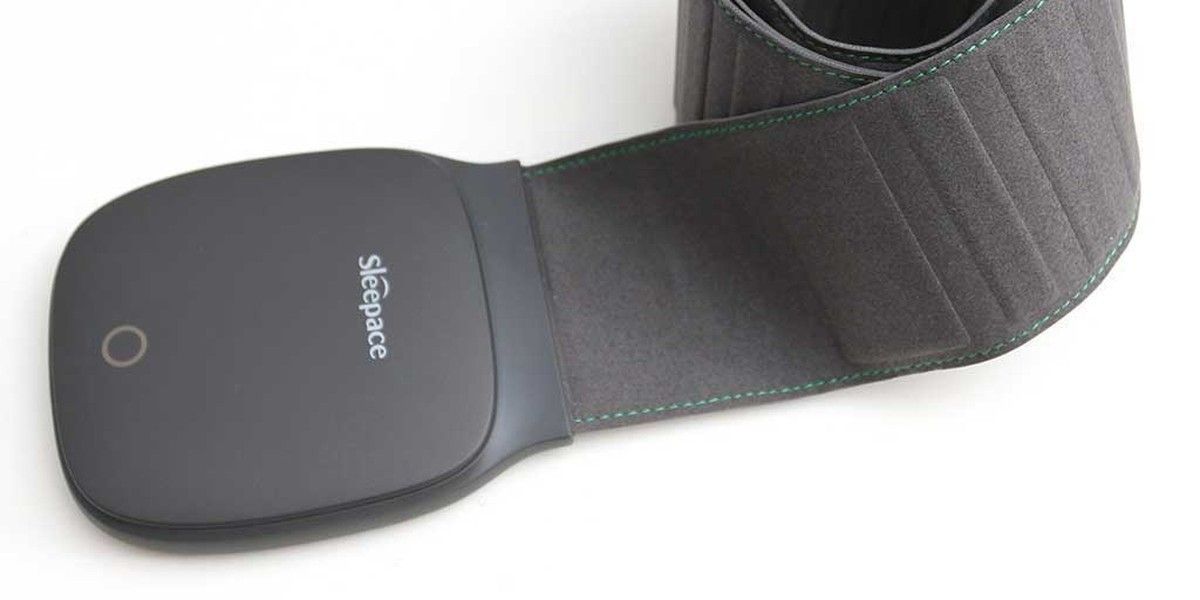Review: Putting Sleepace Through Its Paces
Last updated: October 19, 2016
Pros: Easy instructions, lots of data, fun options including white noise
Cons: Awkward set-up plus occasional inaccurate metrics
Sleepace's RestOn Smart Sleep Monitor's slogan is "Achieve your best sleep." As I'm a not-so-terrific sleeper, I felt optimistic this IoT gizmo would offer slumber improvement. Plus, I thought, I had nothing to lose—except, heaven forbid, more precious hours of sleep. So I gave it a go with hopes of numbered sheep running through my mind.
The product package was nice, neat and had easy-to-follow instructions as to how to set up RestOn. One long, relatively thin fabric strap, similar to the texture of a seatbelt, goes on the mattress under the sheet, which I would eventually lay upon. This hooks to a small square sensor that attaches to the side of the mattress. Simple enough, but the strap had nothing to hold it in place. A piece of duct tape made for a scrappy and unsophisticated—and hardly IoT—fix. It did the trick for my trial, but at RestOn's $149.99 price point I expected a solution that was a bit more elegant.
I had higher hopes for the tech. After downloading the free Sleepace app to my iPhone, I started answering a fairly standard series of questions. First up? My birthdate. Easy, so I thought. But the app kept listing me a year older. I asked my husband to try the app on his Samsung phone. The same glitch ensued.
As for weight and height, I'm used to pounds and feet and inches, not kilograms and centimeters. Sleepace is based out of China (although there is a U.S presence out of California) which uses the metric system. As my junior high math wasn't coming back to me, I had to look up the conversions. Not a big deal—but good to know or my stats would have been dramatically inaccurate.
Finally, I'd set up my account, and launched the app. On first glance the visuals were modern and clean, but moving around the program? Not intuitive. I spent about 10 to 15 frustrating minutes trying to glean how readings were recorded and where I could find my sleep results. (Data is sent via Bluetooth to any current iOS and Android device and tablets, and is also stored in the cloud.)
As for fun add-ons, the app does offer some interesting options, such as white noise that can plays through your phone. I chose to mute that. There are also tidbits of sweepingly general sleep-better advice. I first wanted to see how I slept.
OK, night one. I hopped in bed and immediately felt the discomfort of the strap under my sheet. Not the worst, but certainly not a helper in the sleep department. Trying to tune that out, I flipped the side mattress device over to alert the device to turn on. Finally, I was ready for sleep as directed, hit the "start sleep" mode on the app on my phone, and attempted to drift off to slumberland.
I woke up the next morning, knowing I had a so-so sleep as usual. RestOn offered me its review and analysis of my total sleep time, overall percentile of sleep adequacy, heartbeat and breathing rates, and tossing and turning measures. I was given a score in the mid-70s (of 100 being best) with breathing and heartbeat time that seemed reasonable. But how could I know for sure?
I'm positive it took longer to fall asleep than the app showed. How? Before nodding off I checked status updates on Facebook, read email and talked to my husband. Since I knew that metric was off, I didn't feel strong about the rest.
Night two, I had similar results as I did the night before. This went on for the rest of the week. Plus there were other issues as well. One evening, I tried to start the sleep mode on my phone, but the app decided to launch an update on its own. I must have fallen asleep before that completed, because when I woke up in the morning I realized I never hit the "start sleep" counter. Too bad. Also, when I was able to record, I found disturbingly similar data each time.
Ultimately, I am just not sure how RestOn's report will help me get a better sleep in the future. Although the company says its data is akin to professional guidance, being armed with details about my own heartbeat and breaths doesn't exactly give me marching orders on how to get a solid eight each night.
If you're looking for sleep analysis, RestOn provides. But without the confirmation of a doctor or sleep professional—or instructions on how to apply these statistics to a sleeping program of my own— I will never know if the findings are indeed true. Maybe the answer will come to me in a dream.
If you'd like to try it for yourself, RestOn is compatible with iPhone 5-6 Plus, Samsung Galaxy, Google Nexus, Android devices, and the app pairs with iOS 7 and above and Android 4.3 and above.
